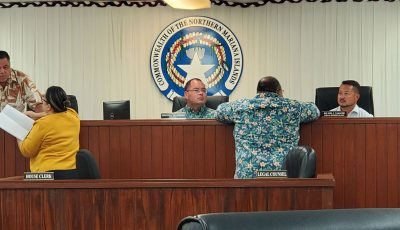‘Lack of action’
Senate President Victor B. Hocog (R-Rota) recently told the media that he and House Speaker Joseph Deleon Guerrero (Ind-Saipan) have initiated moves to address the apparent “lack of action” on both sides on a number of bills, but stopped short of specifying which bills—in his opinion—ought to be on Gov. Eloy S. Inos’ desk for action as soon as possible.
It was not until June 16 or five months since the 19th Legislature took oath of office that the first of their bills became public law. No, it was not a revenue-generating bill, not a cost-cutting legislation, and certainly not about appropriating or reprogramming funds to pay the government’s utility service debts to the Commonwealth Utilities Corp.
Rather, it’s a bill that changes the time of lawmakers’ inaugural session. Public Law 19-1, formerly Sen. Justo Quitugua’s (Ind-Saipan) Senate Bill 19-8, sets the House inaugural session at 10am and the Senate, at 11am on the second Monday of January in the year following the regular general election.
We’re only talking of CNMI-wide bills here, not local bills that have more chance of becoming local laws. And as always the case, more resolutions, joint resolutions, and commemorative resolutions get adopted.
We don’t measure lawmakers’ success or effectiveness by the number of bills introduced or the speed in which these bills pass both houses, but on the quality of bills that are debated, reviewed by and reported on by committees, and voted on by the full House or Senate.
It’s also not about passing any bill just because it provides a new source of revenue, but making sure the bad bills do not get passed. In the past months, lawmakers’ debates or discussions on pieces of legislation were not even about stemming waste of public funds, ensuring public safety, public health or revenue generation. In two or more sessions, for example, the debate was more on making sure Vice Speaker Ralph Demapan (R-Saipan) automatically becomes speaker when Joseph Deleon Guerrero gives up his post next year under their highly publicized power-sharing deal.
If the presiding officers of the Senate and House are lamenting a lack of action on both sides on bills, it may well be because most of the members do not feel a sense of urgency or lack the required information to pass or reject most of the bills so far introduced.
Samples of the bills in the Senate are legalizing marijuana for medicinal use; establishing an advisory committee to review the compensation of the governor, lieutenant governor, and lawmakers and make recommendations; and waiving the CNMI Scholarship repayment of grants and loans for workers from the armed forces and spouses of active members.
Others ensure a smooth mayoral transition; selection of a teacher representative within the Public School System to serve as a nonvoting teacher representative in the CNMI State Board of Education; restricting the transfer of fixed assets or capital goods from legislative offices; establishing a solid waste transfer station in Kagman and Saipan’s southern part; ensuring that a local workforce with a degree is given credit for the necessary work experience through their education to allow them to meet civil service requirement; and naming Saipan as the official capital of the CNMI.
In the House of Representatives, there are also all kinds of resurrected bills and fresh ones that include taxing and charging more tourists and residents alike for visiting certain tourist spots, abolishing the Department of Public Lands, creating a Second Marianas Political Status Commission, and holding primary elections for the governor and attorney general.
Moreover, the House and Senate need to follow their own house rules in handling the bills introduced and not allow them to just die a natural death regardless of the nature of these measures.
The House, for example, has for years not often followed its own rules specifically dealing with bills assigned to committees. Each standing or special committee is supposed to submit a written report to the speaker within 60 days from the date a piece of legislation was referred to that committee, unless the speaker orders a shorter or longer time pursuant to the House leadership’s decision.
A number of bills disappear from radar the moment they’re assigned to certain committees that are supposed to review them and make recommendation to the full House for passage or rejection—until their terms are over and a new set of lawmakers is sworn into office. And worse, certain committees appear to be black holes for bills, so good luck to the pieces of legislation referred to them.



























